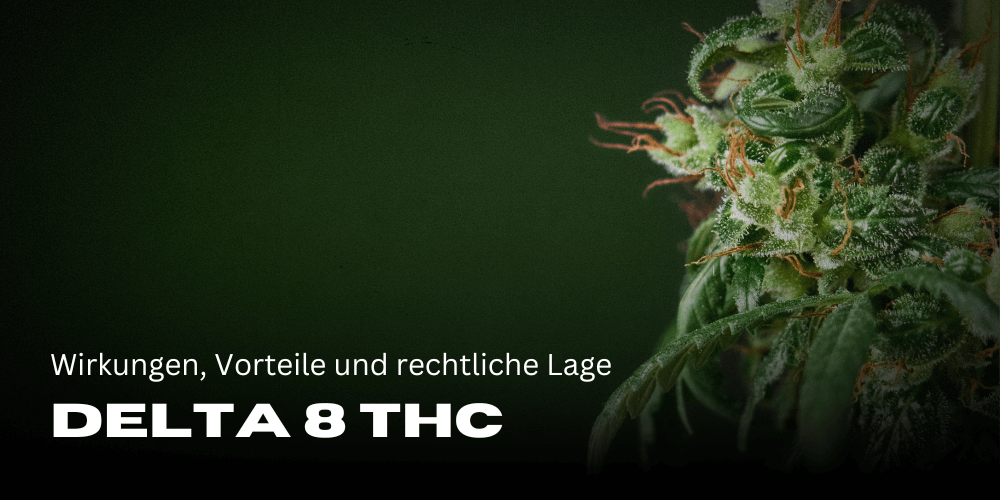Effects and benefits of Delta 8 THC
Delta 8 THC is becoming increasingly popular, not only for its mild psychoactive effects, but also for its potential medicinal applications. In this section we look at the main effects and benefits of this cannabinoid.
Psychoactive effects of Delta 8 THC
Delta 8 THC offers a unique psychoactive experience that differs significantly from Delta 9 THC. Many users report a clearer, more focussed high that can be less intense and therefore more enjoyable. Unlike Delta 9 THC, which is often associated with side effects such as anxiety and paranoia, Delta 8 THC appears to minimise these effects. This makes it particularly attractive to those who want to enjoy the psychoactive effects of cannabis without experiencing the negative side effects.
Medical applications of Delta 8 THC
The medical applications of Delta 8 THC are promising. Studies and field reports suggest that it offers a range of therapeutic benefits. These include pain relief, reduction of nausea and vomiting, especially in cancer patients, and appetite stimulation. In addition, some research shows that Delta 8 THC may have anti-anxiety properties, making it a potential treatment for anxiety. These diverse applications make Delta 8 THC an interesting candidate for medical research.
Legal situation of Delta 8 THC
The legal situation of Delta 8 THC is complex and varies considerably around the world. In this section, we take a look at international legislation and the specific situation in Germany.
International legislation on Delta 8 THC
Internationally, the legislation on Delta 8 THC varies greatly. In some countries it is completely legal, in others it is strictly prohibited. In the USA, for example, the legal status varies from state to state. Some have legalised the sale and use of Delta 8 THC, while others have classified it as illegal. These varying regulations create a confusing situation for consumers and companies involved in the Delta 8 THC market.
Situation of Delta 8 THC in Germany
In Germany, Delta 8 THC falls under the Narcotics Act, which means that its possession, sale and use are illegal. The German government has made it clear that all psychoactive isomers of THC, including Delta 8 THC, are categorised as narcotics. This strict regulation significantly restricts the use and research of Delta 8 THC. Despite these restrictions, interest in Delta 8 THC is growing, and there is a growing movement in favour of a review and possible adjustment of the legal provisions.
The legal hurdles and the complex legal situation pose a challenge, but they also offer room for discussion and possible reforms in the future. It remains to be seen how legislation will develop in Germany and worldwide as the understanding and acceptance of Delta 8 THC continues to grow.
Safety and quality concerns with Delta 8 THC
Although Delta 8 THC offers many potential benefits, there are also significant safety and quality concerns that need to be addressed. These aspects are particularly important as the regulation and control of this cannabinoid is still in its infancy in many regions.
Lack of regulation of Delta 8 THC
A key problem with Delta 8 THC is the lack of regulation. As it is a relatively new product on the market, there are few to no standardised regulations on production, sale and quality control. As a result, the quality and purity of products can vary greatly. Consumers may purchase products that have not been adequately tested or contain impurities, which can pose significant health risks. Without strict regulation, the dosage and labelling on many products also remains unreliable.
Potential risks and side effects of Delta 8 THC
As with all psychoactive substances, there are potential risks and side effects associated with Delta 8 THC. Although it is often described as less intense and therefore safer than Delta 9 THC, side effects such as drowsiness, dry mouth, red eyes, decreased blood pressure and, in some cases, anxiety can still occur. In addition, the long-term effects of Delta 8 THC has not yet been sufficiently researched, which means that there could be unpredictable health effects. Caution is advised, especially for people with pre-existing conditions or who are taking medication.
Future prospects for Delta 8 THC
The future of Delta 8 THC is promising, but also characterised by many uncertainties. With increasing research and growing interest in the potential benefits of Delta 8 THC, the legal and social perception of this substance could change.
Research and development on Delta 8 THC
Research into Delta 8 THC is still in its infancy, but the studies to date are promising. Scientists are investigating the diverse effects of this cannabinoid and its potential applications in medicine. Further research could help to better understand the safety profiles and therapeutic potential of Delta 8 THC. This could also promote the development of new products and applications tailored to specific medical needs.
Potential for the legalisation of Delta 8 THC
The legalisation of Delta 8 THC could have a significant impact on both the medical and recreational markets. As more scientific evidence of the safety and benefits of Delta 8 THC becomes available, it could pave the way for legalisation. Countries that have already made progress in legalising cannabis may see Delta 8 THC as the next logical step. Regulated legalisation would not only improve the safety and quality of the products, but also create new economic opportunities and expand access to potentially important therapeutic applications.
To summarise, Delta 8 THC offers an exciting prospect in the world of cannabinoids, but it remains to be seen how the legal and scientific framework will develop in the coming years.
















